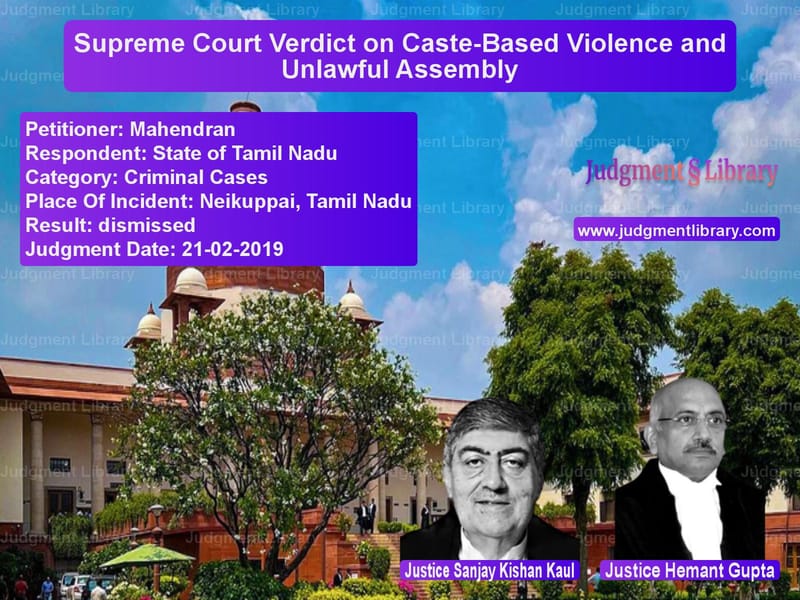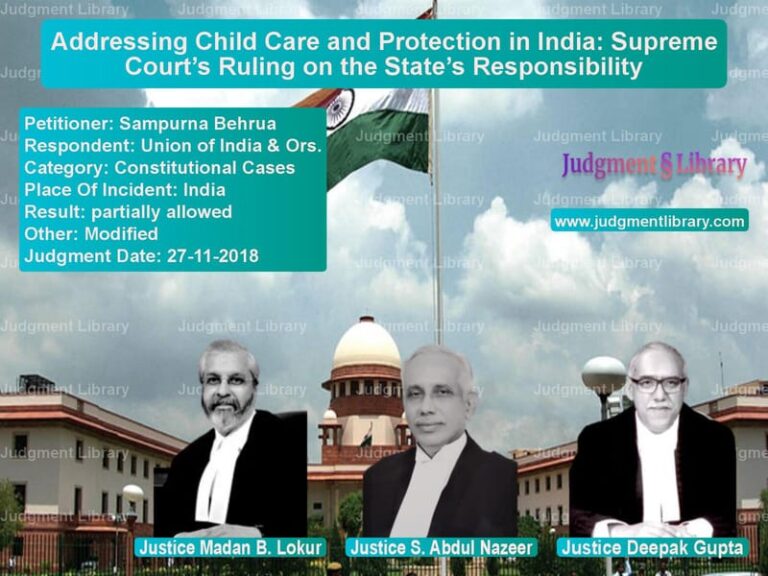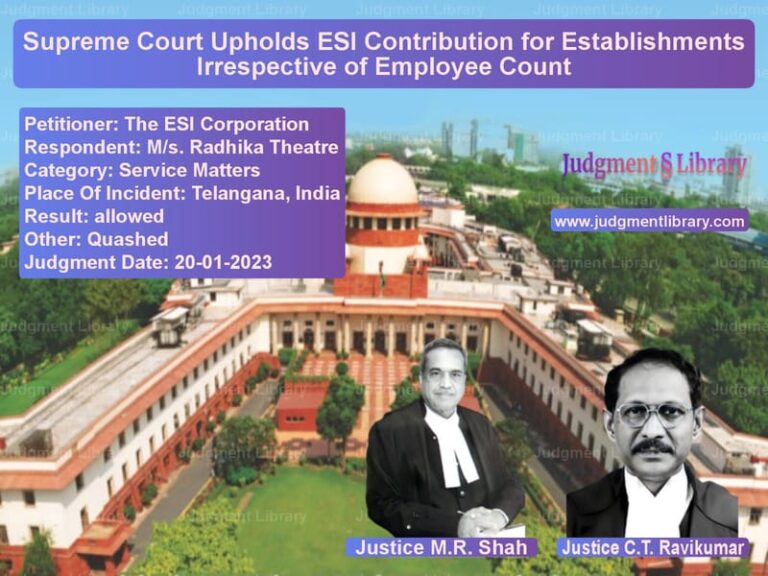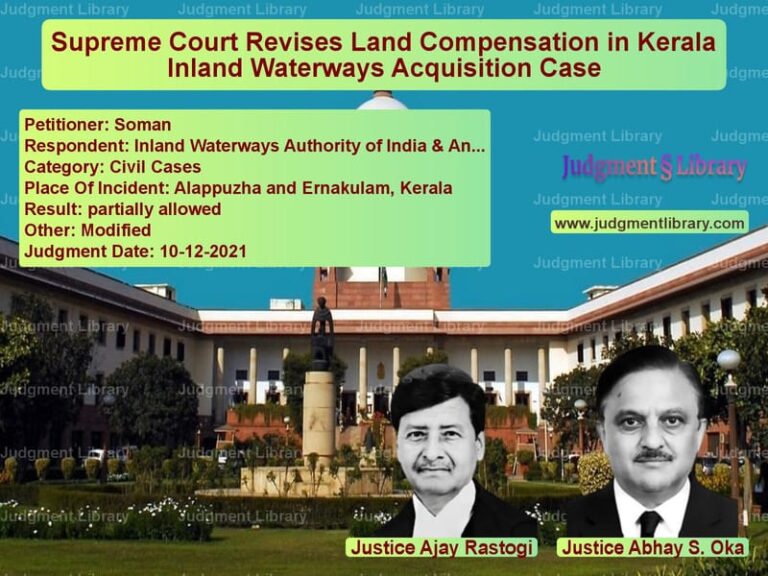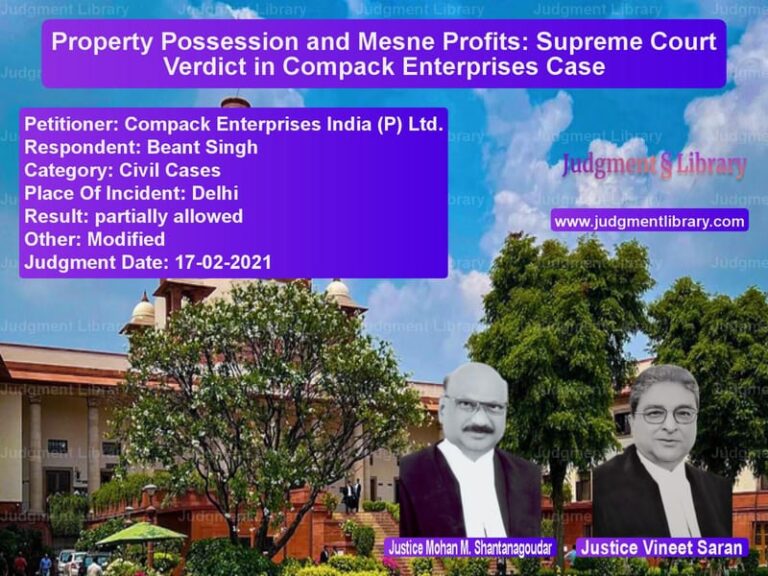Supreme Court Verdict on Caste-Based Violence and Unlawful Assembly
The case of Mahendran vs. State of Tamil Nadu is a significant legal battle that sheds light on the devastating consequences of caste-based violence in India. The Supreme Court’s judgment serves as a crucial precedent in handling unlawful assembly and mob violence under the Indian Penal Code (IPC). The case, which revolves around the brutal murder of a Dalit man in the village of Neikuppai, Tamil Nadu, exposes the deep-seated social conflicts and the critical role of the judiciary in upholding justice.
This article provides an in-depth analysis of the case, including the background, arguments presented by the petitioner and the respondent, the legal provisions invoked, the Supreme Court’s reasoning, and the broader implications of the judgment.
Background of the Case
The incident that led to this case took place on March 13, 1994, in Neikuppai village, Tamil Nadu. The dispute arose due to longstanding tensions between different caste groups. On the night before the crime, tensions escalated when an unidentified person set fire to a hut in the village, allegedly targeting a Dalit family. The following morning, a violent mob stormed the house of Murugaiyan, a Scheduled Caste (SC) resident.
The mob, consisting of individuals armed with sickles, stones, and other weapons, surrounded his hut. The key accused, Ravi (A-1), was seen pouring kerosene on the thatched roof, while Singaravelu (A-2) set it on fire. As the house was engulfed in flames, Murugaiyan attempted to flee, but the attackers chased him down and hacked him to death with sickles.
Legal Provisions Invoked
The prosecution charged the accused under the following provisions of the IPC:
- Section 302 – Punishment for murder
- Section 149 – Every member of unlawful assembly guilty of offense committed in prosecution of common object
- Section 326 – Voluntarily causing grievous hurt by dangerous weapons
- Section 148 – Rioting, armed with deadly weapon
- SC/ST (Prevention of Atrocities) Act – Committing offenses against Scheduled Caste individuals
Arguments of the Petitioner
The defense, representing the accused, raised several arguments:
- The FIR was delayed and fabricated to falsely implicate the accused.
- The prosecution’s witnesses were unreliable as they were relatives of the deceased.
- The accused were not present at the scene and were framed due to political pressure.
- The murder was the result of an individual altercation, not a premeditated attack.
The defense cited legal precedents to argue that circumstantial evidence alone could not establish guilt beyond a reasonable doubt.
Arguments of the Respondent (State)
The prosecution, representing the State of Tamil Nadu, presented strong counterarguments:
- Multiple eyewitnesses (PW1-PW3) confirmed the presence of the accused at the crime scene.
- The forensic evidence matched the nature of the injuries sustained by the deceased.
- The accused had a clear motive rooted in caste-related animosity.
- The delay in filing the FIR was justified as the incident occurred in a rural area with logistical challenges.
“The brutality of the attack, coupled with the targeted nature of the violence against the victim, demonstrates a clear violation of the SC/ST (Prevention of Atrocities) Act.” – Prosecution Argument
Supreme Court’s Analysis and Judgment
The Supreme Court analyzed whether the conviction under Section 302 IPC was sustainable. The key observations were:
- The presence of the accused at the scene was corroborated by multiple eyewitnesses.
- The injuries sustained by the victim matched the weapons used in the crime.
- The act of setting fire to the victim’s house demonstrated an intention to cause harm.
- The invocation of Section 149 IPC was justified as the attack was executed by an unlawful assembly with a common object.
The court relied on previous rulings, including State of Orissa vs. Banabihari Mohapatra, which established that delay in filing an FIR does not invalidate prosecution evidence if properly explained.
Ultimately, the Supreme Court upheld the conviction of the accused under Sections 302, 149, and 326 IPC, dismissing the appeal.
Impact and Legal Precedent
This judgment is significant as it reinforces the judicial approach toward caste-based violence and mob justice. Key takeaways include:
- The importance of eyewitness testimonies in criminal cases.
- Affirmation of the SC/ST Act in addressing caste-related crimes.
- Clarification on the applicability of Section 149 IPC in cases involving multiple accused.
- Reinforcement of judicial scrutiny in cases involving mob violence.
- Significance of forensic evidence in corroborating witness statements.
Conclusion
The Supreme Court’s ruling in this case stands as a testament to the importance of delivering justice in crimes motivated by caste-based discrimination. The verdict not only brings closure to the victim’s family but also serves as a deterrent against future incidents of communal violence.
Petitioner Name: Mahendran.Respondent Name: State of Tamil Nadu.Judgment By: Justice Sanjay Kishan Kaul, Justice Hemant Gupta.Place Of Incident: Neikuppai, Tamil Nadu.Judgment Date: 21-02-2019.
Don’t miss out on the full details! Download the complete judgment in PDF format below and gain valuable insights instantly!
Download Judgment: Mahendran vs State of Tamil Nadu Supreme Court of India Judgment Dated 21-02-2019.pdf
Direct Downlaod Judgment: Direct downlaod this Judgment
See all petitions in Murder Cases
See all petitions in SC/ST Act Case
See all petitions in Bail and Anticipatory Bail
See all petitions in Theft and Robbery Cases
See all petitions in Attempt to Murder Cases
See all petitions in Judgment by Sanjay Kishan Kaul
See all petitions in Judgment by Hemant Gupta
See all petitions in dismissed
See all petitions in supreme court of India judgments February 2019
See all petitions in 2019 judgments
See all posts in Criminal Cases Category
See all allowed petitions in Criminal Cases Category
See all Dismissed petitions in Criminal Cases Category
See all partially allowed petitions in Criminal Cases Category

